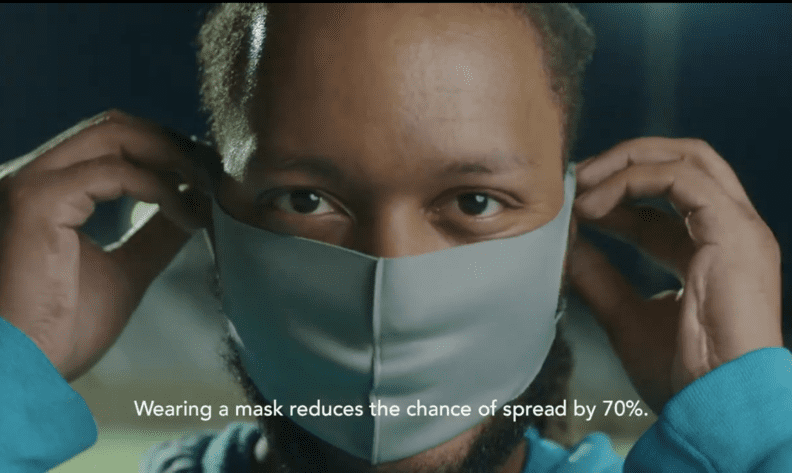Michigan Launches ‘Spread Hope, Not COVID’ Campaign, Emphasizes Mask Usage in Public
September 14, 2020 Crain’s Detroit Business: State launches new ad campaign to counter coronavirus as case counts rise in college towns
Crain’s Detroit Business: State launches new ad campaign to counter coronavirus as case counts rise in college towns
By Chad Livengood
The Michigan Department of Health and Human Services is launching a new statewide advertising campaign Monday promoting the use of face masks and getting tested for COVID-19 just as the coronavirus is showing new signs of spread in college towns.
The state is spending $5 million in federal funds on the “Spread Hope, Not COVID” campaign emphasizing the need for continued mask-wearing in public, social distancing, testing and quarantining to curb the spread of the novel coronavirus.
“We know that every day we wear a mask, every day we socially distance, we bring closer the day when we don’t have to do those things anymore,” MDHHS Director Robert Gordon said in an interview with Crain’s.
MDHHS hired Birmingham-based ad agency Brogan & Partners to produce the advertisements. Martin Waymire, a Lansing public relations firm, is handling the public relations for the ad campaign.
The health department is launching the ad campaign on TV, billboards, social and digital media as public health experts are bracing for a potential second wave of the coronavirus this fall coinciding with flu season.
“We knew we were going to face challenges in the fall,” Gordon said. “It makes the campaign more important than ever.”
The new public awareness campaign comes as COVID-19 caseloads have been rising in several Michigan counties that are home to state universities and private colleges, while declining in other population centers such as Genesee, Kent, Macomb, Oakland and Wayne counties in recent weeks.
While most universities and colleges have moved the majority of their courses to an online format, none have closed campuses entirely. And off-campus student housing has quickly become a hotspot for spread of the virus in college towns, particularly at parties, public health agencies have said.
Ingham County’s health department on Saturday issued an “urgent” plea strongly recommending Michigan State University students quarantine for two weeks after 324 people affiliated with the East Lansing school tested positive for the coronavirus.
“If we do not slow the spread immediately, we will be dealing with the consequences across the county for months to come,” Ingham County health officer Linda Vail said in the statement.
While the call for a mass quarantine of thousands of MSU students was just a recommendation, the health department said more stringent and mandatory restrictions “will be imposed if students do not comply and break the transmission cycle.”
On its website, GVSU is reporting 462 active cases of COVID-19 among a campus community of 28,000, with the number of new cases averaging 45 per day over the previous week.
Isabella County has been dealing with a multi-week coronavirus outbreak that began in mid-August with the return of Central Michigan University students to on-campus housing in Mount Pleasant and student apartment buildings in the mid-Michigan city and neighboring Union Township.
In the four weeks since Aug. 15, Isabella County has reported 325 positive cases of COVID-19 — a six-fold increase from the previous four weeks, state data shows. As of Friday, the Central Michigan District Health Department had identified 266 cases associated with current and former CMU students.
Some smaller counties with colleges and universities also have seen an uptick in cases since students returned to campus.
Houghton County in the Upper Peninsula, home to Michigan Tech University in Houghton and Finlandia University in Hancock, recorded 120 positive cases of COVID-19 over the past four weeks — a 17-fold increase from the seven cases recorded between mid-July and mid-August.
Lenawee County, home to Adrian College and Siena Heights University in Adrian, saw its COVID-19 case count over the past four weeks increase by 43 percent from the prior period, according to state data.
Colleges have been testing students aggressively as they have returned to campus, likely turning up cases that would not have otherwise been detected. At the same time, many densely populated counties have seen case counts decline.
A Crain’s analysis of the last four weeks of COVID-19 data reported to the state shows Detroit, suburban Wayne County, Washtenaw, Oakland, Macomb, Kent and Genesee counties all had decreases in COVID-19 case growth when compared to the previous four-week period from July 18 to Aug. 14.
Washtenaw County is home to the University of Michigan in Ann Arbor and Eastern Michigan University in Ypsilanti, which delayed its main move-in day by three weeks for students living on campus until Sept. 17 in response to coronavirus outbreaks on other college campuses.
Gordon said the “Spread Hope, Not COVID” campaign will be broader than a separate “Rona” ad campaign funded by major Michigan businesses, hospitals and unions that targets younger adults, particularly college students. Another $5 million is being spent on the Rona campaign on social media, radio, billboards, digital video and television over the next four months.
The “Spread Hope, Not COVID” campaign aims to keep the public engaged on the need for hand-washing, wearing masks and other habits that can tamp down transmission of the airborne virus, Gordon said.
Gov. Gretchen Whitmer’s mandate of masks for entry into any indoor business “made a very real difference” in slowing community spread of the coronavirus, Gordon said.
“That challenge now is keeping it going,” Gordon said. “Everybody is tired of wearing a mask every day. Not having normal social engagements with friends and loved ones is exhausting. I think we recognize that. We all feel it.”
“And we’re trying to say to people, we still have hope, we believe we can get through this.”
